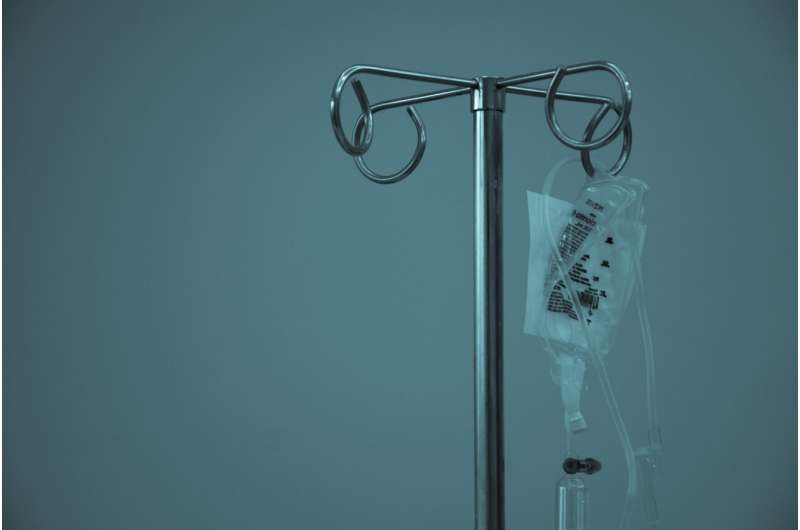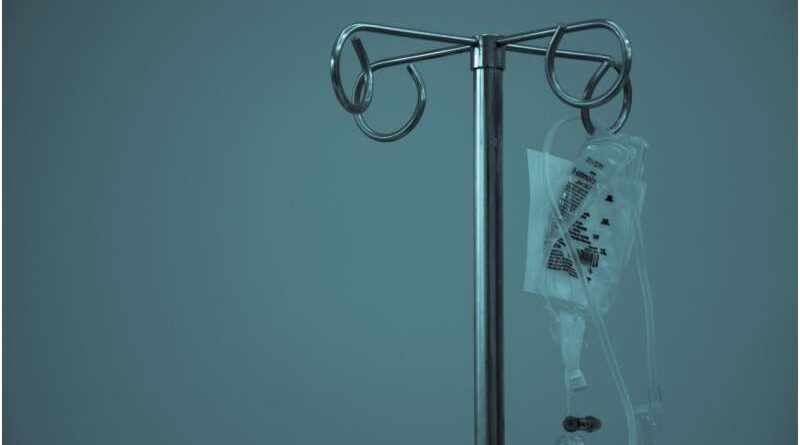Helene and CVS offer two reviews for 25,000 patients living on IV nutrition

Credit: Unsplash/CC0 Public Domain
A CVS representative entered Lisa Trumble’s third-floor hospital room at Berkshire Medical Center in Pittsfield, Massachusetts, to announce that everything was ready for Trumble to return home, where she relies on nutrition. IV due to severe stomach problems that left him unable to eat.
It was Tuesday, Oct. 8. The next morning, a social worker and a doctor woke Trumble up to say that his release had been revoked. CVS would no longer provide her with pet food, and she had to stay in the hospital. “I was thrown between Tuesday night and Wednesday morning with no regard for my life or my health,” Trumble said from his hospital bed eight days later.
After this article was published, on Oct. 18, Trumble said he is being released, after his guardians found a new service. “I’m afraid they’ll run out of supplies,” he said. “My backup plan is to always go back to the hospital.”
Trumble is among the 25,000 patients in the US whose lives depend on parenteral nutrition, or PN-IV bags containing life-sustaining amino acids, sugars, fats, vitamins and electrolytes. Hurricane Helene destroyed a factory in North Carolina that produced 60% of their liquid feed. About two weeks later, CVS announced that its Coram division, a leading infusion pharmacy, was exiting the PN and IV antibiotic business.
The hurricane forced Baxter International to supply its dwindling inventory. The chemists who supply Trumble and other patients like him were already plagued by shortages, and the measure means that the remaining infusion drugs will not be able to take customers cut off by CVS, to said David Seres, director of clinical nutrition at Columbia University Medical Center in New York. York.
At the Mayo Clinic in Rochester, Minnesota, seven or eight patients were scheduled to go home on Tuesday but could not be discharged because no infusion company would accept them, said Manpreet Mundi, a Mayo endocrinologist. He said that patients will get sick within a day or two without proper nutrition.
By October 18, household goods were available for all but a few, Mundi said. “A lot of public pressure” on Coram was beginning to have an effect, he said.
Although the FDA is allowing emergency shipments of Helene’s diluted IV fluid, along with the production of other fluids by US compounding pharmacies, it is unclear how long it will take to replenish supplies, it said. Mundi, who is a board member. American Society for Parenteral and Enteral Nutrition and medical advisor to the Oley Foundation, which advocates for PN patients.
“We’re trying to raise awareness that this could get worse before it gets better,” he said.
Patients dependent on PN have various conditions that make them unable to digest food. Some have congenital problems or problems such as Crohn’s disease that lead to the removal of intestinal organs. Others had wounds caused by cancer, car accidents, or gunshot wounds, or by foes born with malformed intestines. In most patients, fluid is pumped through a catheter into a large vein near the heart.
Tragedy struck the community two years ago when CVS Health announced it was closing half of Coram’s 71 pharmacies.
CVS, which recently laid off nearly 3,000 people amid reports of a potential layoff, on Oct. 8 began telling its remaining 800 to 1,000 PN customers that they would have to find other infusion pharmacies. A news release issued to KFF Health News suggested that the flow would continue into January, but for patients like Trumble, the effect was immediate.
Specialty infusion medicine is a “challenging environment” for all companies “and Coram has not been immune to these challenges,” CVS said in a release. “Therefore, we have re-evaluated our services.”
When asked about Trumble’s case, CVS Health spokesman Mike DeAngelis said the company will “try to resolve it.” The next day, a company called Optum stepped in to replace Coram, Trumble said.
It’s hard enough for such patients to find new suppliers for their supplies, which can include 120 pounds of IV fluids a week.
Coram’s departure “made a big crisis worse,” Mundi said. “It’s become a kind of double whammy.”
Baxter International’s North Cove plant produced most of the country’s high-concentration dextrose, a major source of energy for PN patients, as well as saline solution and sterile water, also essential supplies.
A week after Helene made landfall, Hurricane Milton threatened an IV provider with an IV fluid at B. Braun Medical in Daytona Beach, Florida. The federal government helped move 60 trucks of the company’s equipment to safety, but the facility was not spared from the storm. It resumed production on Oct. 11.
That was a big relief to Beth Gore, CEO of the Oley Foundation. She, her husband, and their six adopted children braved the storm for seven hours at their home near Ruskin, Florida. Milton smashed the car and part of the roof, but the family prayed through it and somehow didn’t lose power, even though their neighbors did, Gore said. That kept the IV fluids fresh and the internet, which calmed the children down.
Coram has given his youngest son, 15-year-old Manny, PN for 13 years, and the family will need to find another supplier, he said.
“There’s no point” since Coram cuts its services in 2022, Gore said. “Now there’s this new twist.”
She said her son receives care through Medicaid, whose reimbursement provides access to many infusion drugs. Insurance limits, differences in state approvals, and special nutritional needs create challenges for patients looking for new IV providers in a timely manner, he said.
The FDA announced Oct. 9 that will allow Baxter to import emergency supplies from Canada, China, Ireland and the U.K. Meanwhile, Baxter prioritizes hospital patients over home infusion companies—which lack supplies, Mundi said. .
“We’re all on the phone 24/7,” said Kathleen Gura, president-elect of the American Society for Parenteral and Enteral Nutrition and director of the clinical medicine research program at Boston Children’s Hospital. His team is struggling to find new IV nutrition providers at home for 20 of Coram’s 150 patients he sees.
“Some children have a condition where they can’t absorb at all from their gut and will die of dehydration if they can’t get an IV,” Gura said.
The IV fluids lost in the Baxter disaster are key to all forms of patient care. Many US hospitals conserve fluid by giving some patients oral fluids instead of IVs, or by delaying surgery, said Soumi Saha, executive vice president for government affairs at the Prime Minister’s Office. negotiate the price of group hospitals.
President Joe Biden has proposed the Defense Production Act, which would help the government order companies to prioritize building the Baxter plant.
The military flies in supplies from Baxter plants overseas, Saha said. The prime minister has also asked the FDA to add more PN materials to its shortage list, which will allow large compounding facilities to produce the materials.
Ellie Rogers, 17, of Simpsonville, South Carolina, fears the worst when she can’t find her belongings. He said he suffers from multiple immunological and neurological disorders that require him to receive four liters of IV fluids daily to stay alive.
His provider, the Option Care Health pharmacy in South Carolina, informed the family on Oct. 14 that instead of his weekly supply they sent him bags enough for a day or two. “They don’t really know when they’re going to get what they need,” he said. “Reducing infusions in the past has led to dizziness, nausea, and clotting of his blood.” when he felt like my nerves were going to explode.”
In Oct. 7, a Crohn’s disease patient at Hannah Hale’s infusion pharmacy called and said they couldn’t fill her weekly order of IV bags, prompting her to get a new chemical. .
“I’ve called 14 infusion pharmacies and I haven’t gotten anyone to take me in,” said Dallas, 37. She struggles with weight loss and low blood sugar, and give his tools to raise the risk of a seizure or fainting, he said.
Trumble, 52, who started PN 13 months ago for colon cancer and severe bowel problems, says she is grateful for the hospital and receives excellent care there, but misses her mother. her, 8-year-old son and grandson, Jordan—and her cats—during her 17-day hospitalization.
Worse, Trumble said, his mother and son, who receive Medicaid payments to care for him, were not paid in his absence.
But without IV nutrition at home, she said, “I would starve.”
KFF Live News 2024. Provided by Tribune Content Agency, LLC.
Excerpt: Helene and CVS have two reviews for 25,000 patients living on IV nutrition (2024, October 21) retrieved on October 21, 2024 from https://medicalxpress.com/news/2024-10 -helene-cvs-whammy-patients-survive. html
This document is subject to copyright. Except for any legitimate activity for the purpose of private study or research, no part may be reproduced without written permission. Content is provided for informational purposes only.
#Helene #CVS #offer #reviews #patients #living #nutrition
